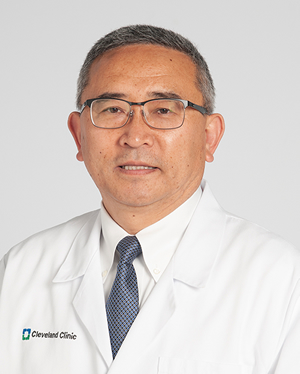Research News
06/20/2022
New Global Center for Pathogen & Human Health Research Paving the Way for National Pandemic Research Participation
Cleveland Clinic researchers to participate in NIH consortium focused on antiviral drug development.
While many of us are still grappling with the current pandemic, a group of multidisciplinary researchers from across the country have their sights set on developing antiviral drugs for viruses likely to cause the next pandemic. In total, $577 million was awarded by the National Institute of Allergy and Infectious Diseases (NIAID), part of the National Institutes of Health (NIH), to create nine antiviral drug discovery research centers across the country.
Cleveland Clinic's Global Center for Pathogen & Human Health Research, a focal point of the Cleveland Innovation District, is making it possible for two of our own researchers to become involved in this national priority.
Jae Jung, PhD, Director of the Global Center for Pathogen & Human Health Research, and Shaun Stauffer, PhD, Director of the Center for Therapeutics Discovery, are working with a multidisciplinary team based out of Scripps Research with the goal of creating drugs aimed at targeting viruses with high pandemic potential – specifically coronaviruses and tick-borne viruses. Scripps Research was awarded $67 million total to create the Center for Antiviral Medicines and Pandemic Preparedness (CAMPP), with Drs. Jung and Stauffer receiving a combined $3.28 million for their projects.
"The scientific findings that will be discovered through the research enabled by this grant have the potential to accelerate our response to future pandemics," says Serpil Erzurum, MD, Chief Research and Academic Officer. "Drs. Stauffer and Jung's participation in this collaboration of the nation's leading research experts represents Cleveland Clinic's growing investment into studying viral pathogens to prepare for the next public health threat."
Finding Better Drugs for Treating COVID-19
Dr. Stauffer and his team will be studying a promising COVID-19 drug target derived from the SARS-CoV2 virus, called 3CLpro (3-chymotrypsin-like protease). Plaxlovid, the only current FDA-approved 3CLpro antiviral drug available to treat COVID-19, is a combination drug in which a liver enzyme inhibitor is required to help boost its effectiveness.
"As a result, drug-drug interactions are a concern, and some people are altogether excluded from receiving Plaxlovid," says Dr. Stauffer. "Due to this limitation, as well as concerns of resistance and future variants, the identification of improved stand-alone 3CLpro therapies remains."
The team has been urgently pursuing new drug molecules with improved efficacy and has several promising compounds that they will further study at Cleveland Clinic's Florida Research and Innovation Center.
"We're racing to discover better antivirals for the treatment of both current and future variants of COVID-19 and other coronaviruses," says Dr. Stauffer. "The molecules at our disposal have the ability to be taken orally, with enhanced metabolism profiles, and have increased overall potency."
Multidisciplinary collaboration with the Scripps Research team through this NIAID grant increases the potential for rapid milestones to be discovered, ultimately helping close the gap between translational research and clinical drug trials.
Tick-borne Viruses: The Next Emerging Pandemic?
Dr. Jung's research will build on his previously published study on severe fever with thrombocytopenia syndrome virus (SFTSV), an emerging tick-borne virus with 20-30% mortality rate. SFTSV was designated one of the most dangerous viral pathogens likely to cause an epidemic by the World Health Organization in 2017. The virus is spread by an infected longhorn tick (Haemaphysalis longicornis), which has been documented in 17 states since being discovered in America in 2017. No vaccines or therapies currently exist in the prevention or treatment of SFTSV infection.
"SFTSV initiates viral mRNA synthesis through a 'cap stealing' mechanism in which capped host mRNAs are cleaved by SFTSV and the resulting fragments are used to initiate infection," says Dr. Jung. "Our goal is to discover a therapeutic drug that blocks the SFTSV cap-stealing activity."
The Global Center for Pathogen & Human Health Research
These research projects, made possible by the Global Center for Pathogen & Human Health Research, are just the beginning of a global infectious disease program at Cleveland Clinic. The Center received $200 million in funding by the State of Ohio and JobsOhio along with a $300 million investment by Cleveland Clinic.
Headquartered in Cleveland and spanning Cleveland Clinic's international footprint in Florida, London and Abu Dhabi, the Center is bringing together a research team focused on broadening their understanding of viral pathogens, virus-induced cancers, genomics, immunology and immunotherapies. The support of JobsOhio will position the Center to thrive not just as a research center but a commercial force that will drive new products, jobs and economic development in Ohio.
"The Global Center for Pathogen Research & Human Health will be a command center to help solve deadly threats to our health, economy and communities," says Dr. Erzurum. "The unparalleled investment in the Center will drive workforce development while leveraging Cleveland Clinic's research infrastructure to study pathogens and the immune system in novel ways to develop new diagnostic tests, vaccines and treatments."
Featured Experts
News Category
Related News
Research areas
Want To Support Ground-Breaking Research at Cleveland Clinic?
Discover how you can help Cleveland Clinic save lives and continue to lead the transformation of healthcare.
Give to Cleveland Clinic
